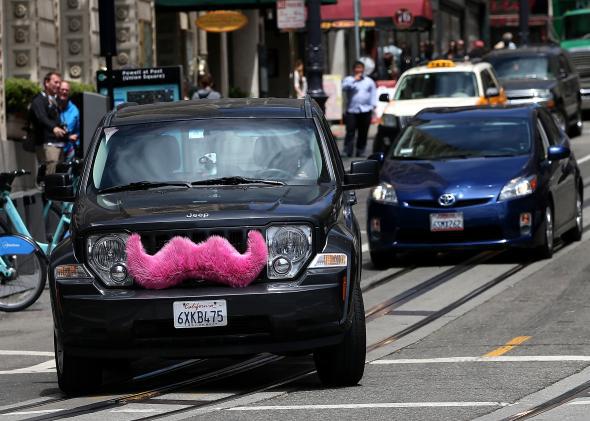Lyft, the purveyor of pink-mustachioed cars, markets itself as a “friendly, affordable ride” for city-dwellers everywhere. But New York officials aren’t buying it. On Friday evening, the New York State Supreme Court in Manhattan forced Lyft to delay its planned launch in Brooklyn and Queens in response to complaints filed by the attorney general’s office. New York is also seeking to halt the company’s operations in Buffalo and Rochester and has accused Lyft of heedlessly disregarding the law.
“As it has done in every other city in which it operates, defendant has simply waltzed into New York and set up shop while defying every law passed whose very purpose is to protect the People of the State of New York,” the attorney general’s office wrote in a court filing. “Despite being warned and told to cease and desist by three separate regulatory and enforcement agencies, defendant has thumbed its nose at the law and continued with its plan to launch in what could become its largest market.”
While Lyft is facing court action, similarly app-based ride service Uber has continued to operate in New York without a problem, making clear that the two platforms are not as interchangeable as they might seem. Why can Uber deliver rides legally in New York while Lyft cannot? In this case, it’s because Uber has tweaked its service to follow New York law while Lyft has so far ignored it.
Uber New York is unique compared with other cities because it operates as a purely commercial service. Elsewhere, Uber Black and Uber SUV are commercial services (their drivers are commercially licensed and their cars commercially insured), while the cheaper UberX is a simple ride-sharing service facilitated by regular people with regular driver’s licenses. But in New York, even UberX drivers are commercially licensed and their vehicles registered with the Taxi and Limousine Commission.
Where Uber ceded to state and city regulations, Lyft has not. In its filing, the attorney general’s office accuses Lyft of violating eight different state and local laws and regulations. These include employing drivers without the proper licensing and insurance and using vehicles that aren’t registered with the Taxi and Limousine Commission. “Lyft is flagrantly flouting state and local laws designed to protect the public health and safety” and “putting the entire public at risk,” the complaint alleges.
Lyft’s legal team was back in court this afternoon attempting to convince a judge to let it move forward with its plans for New York City. While the attorney general’s office issued a statement on Friday claiming the court had hit Lyft with a temporary restraining order, the company contended in a post on its own blog that it agreed to delay the launch and that no such injunction was granted. No word yet on which side succeeded. At any rate, Uber should sit back and enjoy this rare moment: For once it’s another ride service that’s getting the most grief from a major city.
